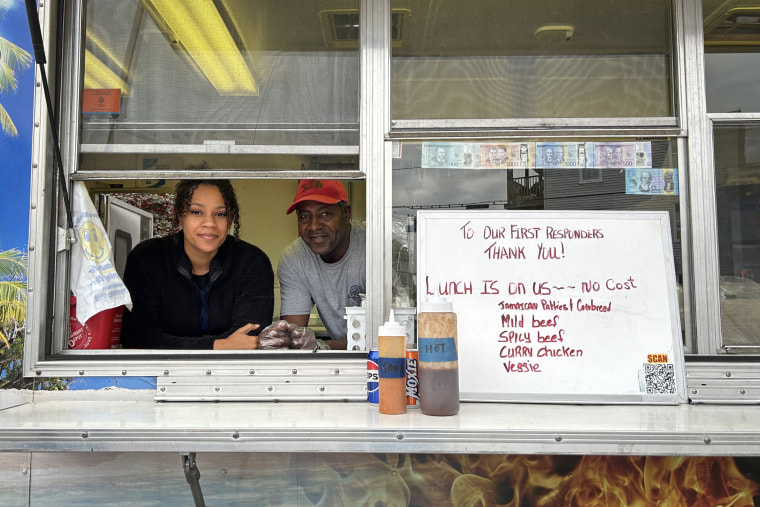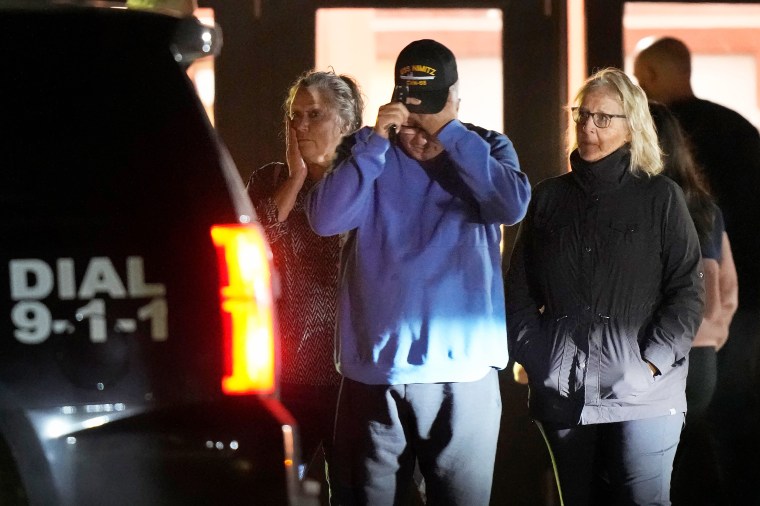LEWISTON, Maine — When chef Jeff Bailey and his daughter Gabriel woke up Thursday, the morning after the worst mass shooting in Maine’s history, and realized most businesses would be closed, they wondered how police hunting the killer and the medical staff members treating the wounded would find anything to eat.
So they decided to open their Jamaican food truck exclusively for first responders, free of charge, making it one of the only places in town with a hot meal available.
The gesture like that by a Black immigrant family in the whitest state in the country is emblematic, Lewiston’s boosters say, of how a struggling postindustrial mill town has been revived in part by a recent influx of non-European immigrants.

The shooting will be an inflection point for a small city and state that are both frequently ranked among the safest in the country after a single night of bloodshed that resulted in roughly the annual number of homicides statewide. The suspect, Robert Card, remains at large, prompting a multistate manhunt after, authorities allege, he shot and killed at least 18 people in Lewiston on Wednesday night.
“We’re always talking about how this kind of thing doesn’t happen here,” said Julien Leavitt, standing outside his house, the first one near a police cordon blocking access to one of the shooting sites. “And then it did.”
He and his partner, Kirsten Brezler, decided to spend the night with family outside of town. “I’m pregnant and didn’t feel safe coming home,” Brezler said.
Like other postindustrial cities, Lewiston has problems with drugs and homelessness, with poverty and abandoned storefronts, and it has been the butt of jokes for people from other parts of Maine. But the city has always been relatively safe, spared the rampant gun violence of other American cities.
“We were planning on trying to move out of here in the next couple of years anyway,” Brezler said before Leavitt interjected: “Now this kind of accelerated that.”
A working-class community
Far from the picturesque coastline Maine is best known for, Lewiston has always been a working-class community.
"Lewiston is a special place. It is a close-knit community with a long history of hard work, of persistence, of faith, of opening its big heart to people everywhere," Democratic Gov. Janet Mills said at a news conference Thursday, noting that she met and married her husband and raised her kids there.
It was built up during the Industrial Revolution by a drop in the powerful Androscoggin River, which provided the power, and tycoon Benjamin Bates, who provided the capital.
With jobs in Bates’ factories and others, Lewiston attracted scores of French Canadian and Irish immigrants, who manufactured uniforms for the Union Army during the Civil War and fought famous labor battles of their own against strikebreakers in union drives for better wages and working conditions.
Bates College, renamed in honor of its industrialist patron, was an early hotbed of abolitionism and one of the first schools to allow women and African Americans to study alongside white men.
But in the 20th century, Lewiston suffered the fate of many New England mill towns and Midwest factory cities as jobs moved elsewhere and pollution choked the air and the water. In the 1950s and the 1960s, the river was effectively used as an open sewer, according to the Natural Resources Council of Maine, with large stretches devoid of any fish.
Losing population and businesses, city leaders worked to turn things around in the 1990s, which coincided with a contingent of Somali refugees’ discovering the city and deciding to resettle here.
Their presence was met with some opposition, some of it from the city’s mayor and white nationalist groups, but a massive counterdemonstration during which thousands of supporters turned out — including many of the state’s major elected officials — seemed to settle things in the immigrants’ favor.
Since then, many have credited the immigrants with helping to revitalize the city, and they’ve been joined by other new arrivals from places like the Caribbean. Lewiston elected the state’s first Somali American legislator last year.
There’s no indication thus far that the gunman was motivated by racial animus. And his selection of targets — a bar and a bowling alley — suggests something else may have been driving him. Card, the suspect, appeared to have mental health issues.
“We are such a tight-knit community. Everybody kind of knows everybody,” said Sheena Hall, who lives in nearby Greene and found out about the shooting early through her teenage son, who is a junior firefighter and happened to be attending a class at the Lewiston fire station when the call came in.

Hall’s mother-in-law is an avid bowler who plays three times a week at the alley where more than a half-dozen people were killed Wednesday night. She wasn’t there Wednesday night, but she said three of her friends were killed.
“I think this is going to put a lot of fear into a lot of people. This is where I took my kids, especially in the winter months,” she said of the bowling alley, Just-in-Time Recreation, before she was interrupted by a phone call announcing school had been canceled for Friday.
A cornhole tournament for deaf people was taking place at the other target, a bar on the other side of town, leaving Catherine Dunn searching for her son-in-law, who had been participating in the event. She’s particularly concerned about his dog, which she thinks might have been in his truck.
“We can see the truck on TV, and I just need to know if the dog is still in there,” she said.
The shooting turned Lewiston, Maine’s second-biggest city, into a ghost town. Everything was closed: schools, dry cleaners, fast food restaurants, dollar stores, coffee shops, gas stations, convenience stores and the Walmart Supercenter across the river in Auburn. A succession of residents and out-of-town reporters disappointed by the locked doors at a 7-Eleven near the hospital complained about struggling to find food and gas and traded rumors they heard about a Vietnamese restaurant or a corner store supposedly open nearby.
“Our prayers go out to everyone in the community,” read the electronic billboard outside a bank.
As the lockdown dragged on, tensions grew, including on the nearby campus of Bates College, where the autumn leaves lay untrammeled on the abandoned quad.
The driver of a white SUV just off campus tentatively rolled down his window to reveal five hungry students packed inside. Despite having been told to lock their doors and stay inside, they were making an escape. They hadn’t eaten in almost 18 hours, said the driver, Freddie Curtis, a junior from Boston, and they wouldn’t be allowed into the dining hall for another hour and half. “We’re all really hungry,” he said.
And with the killer still on the loose, some were taking more aggressive measures in a state known for its high gun ownership and low crime rate.
“I talked to all my neighbors; everybody armed themselves and locked their doors,” said Daniel Blackerby of Lewiston. “Everybody I know is armed now.”
